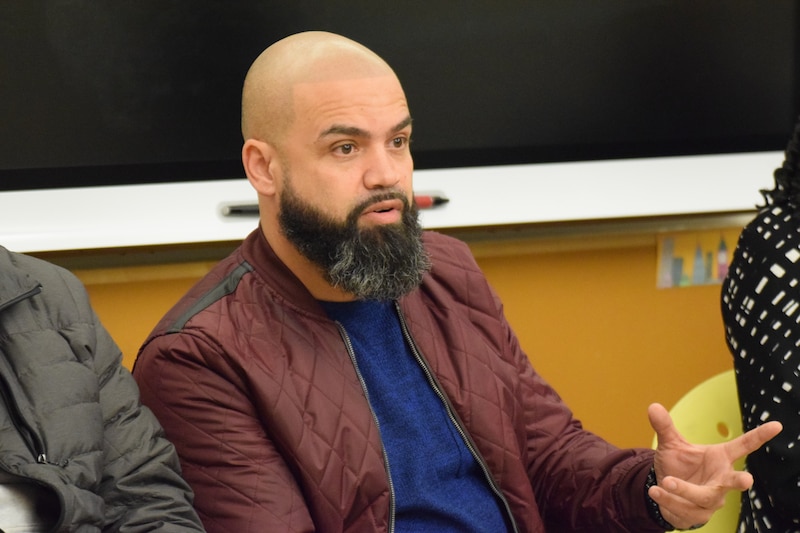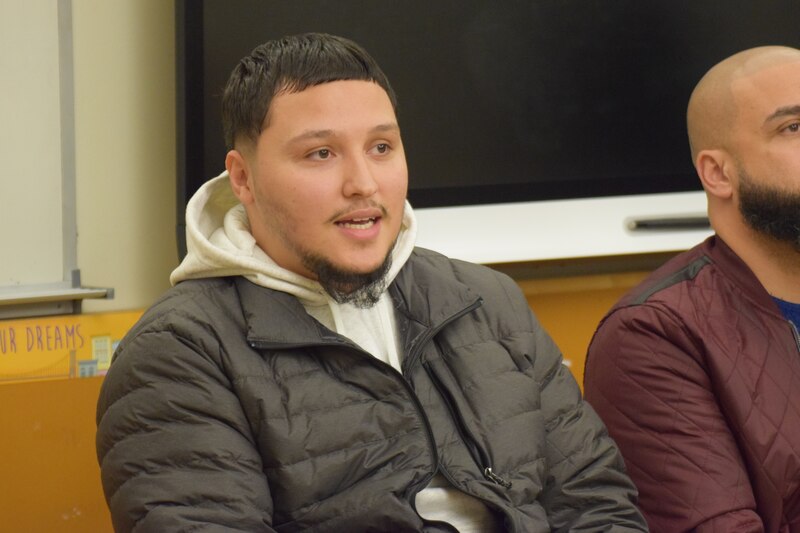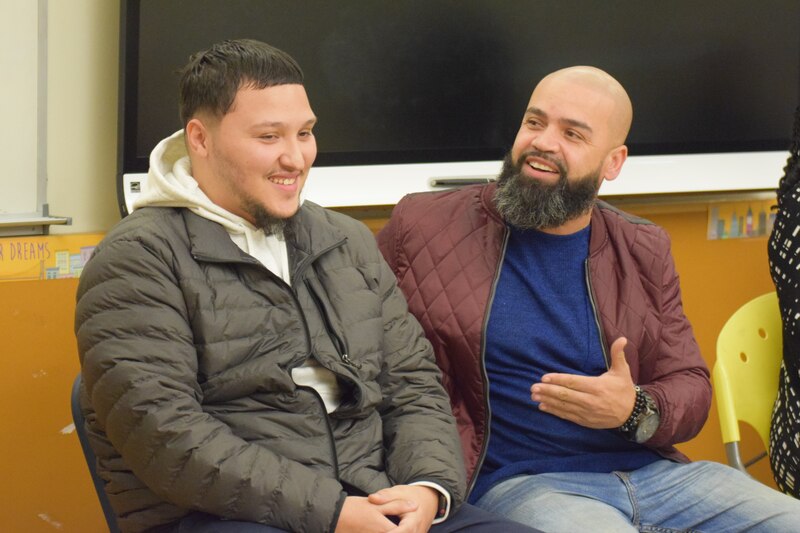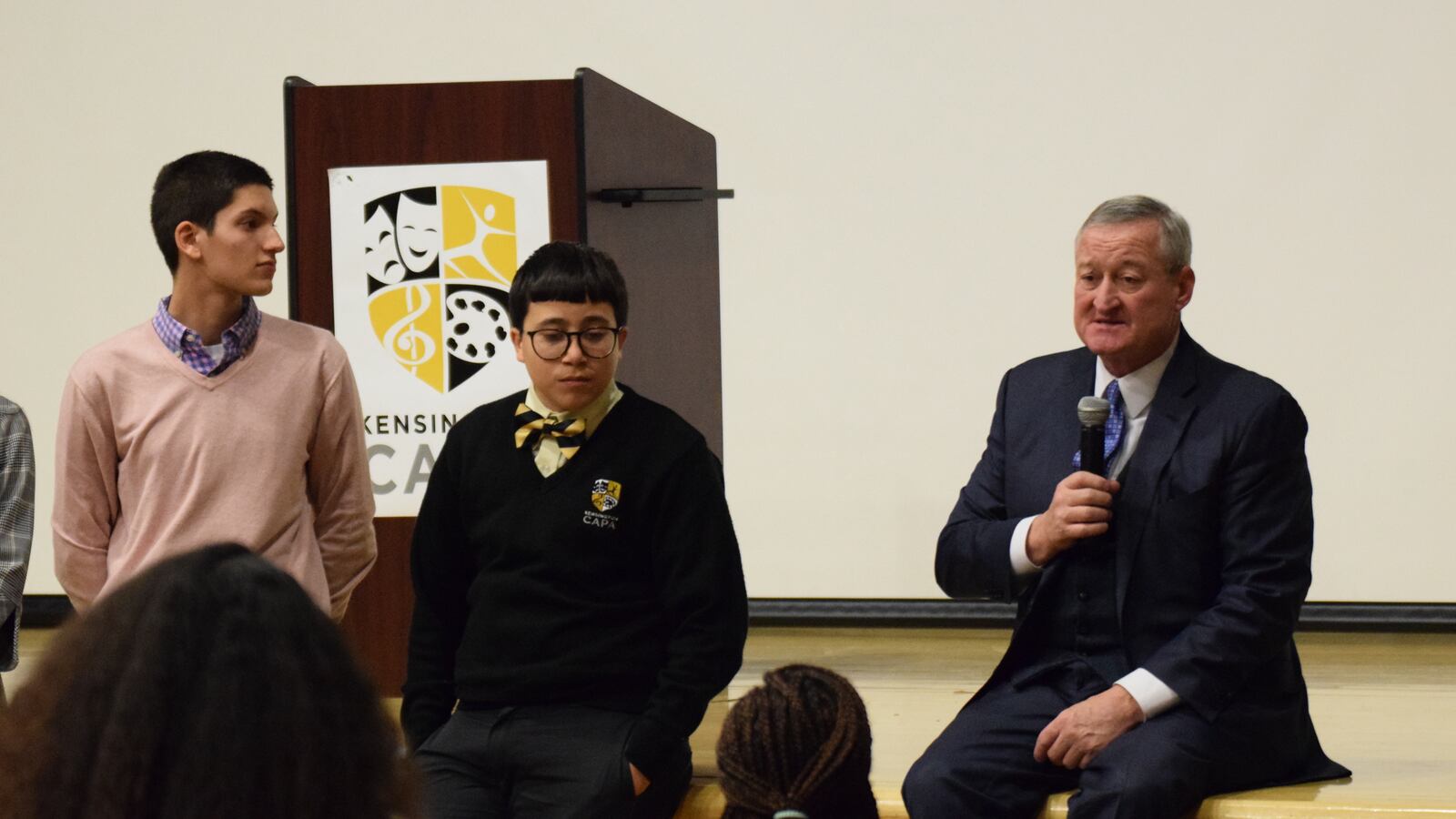This article was originally published in The Notebook. In August 2020, The Notebook became Chalkbeat Philadelphia.
Mayor Kenney sat on the edge of the auditorium’s stage Wednesday at Kensington Creative & Performing Arts High School, speaking to young people about Philadelphia’s increasing homicide rate.
“One homicide is one homicide too many,” Kenney said. “A lot of this has to do with the economy and the fact that, even though the city is doing better, on a certain level, folks are not experiencing the benefits of a growing economy.”
He spoke at an event hosted by the city’s Youth Commission that was focused on preventing violence in neighborhoods.
People are driven to earn money through crime, Kenney said, “when you don’t have work at all – or work that can pay your bills and take care of your kids. As they say, you’ve still got to eat.”
After the opening speeches in the auditorium, students chose among smaller sessions on trauma, preventing violence, and the city’s new violence-prevention plan.
“We need to hear your ideas on what we could be doing better,” Kenney said to the students. He spoke about the pain of burying his father two weeks ago, but his father lived to be 83 and died of natural causes. “I can’t imagine what it would be like to lose a child or a grandchild.”
As mayor, he said, “one of the most difficult things to deal with … is when you get up in the morning, reach over to the nightstand to look at your phone, and you see what’s happened last night,” he said.
The seats filled quickly for a panel about prevention and intervention. Panelists ranged from city officials to a former inmate from Kensington who now works with students to mediate conflicts and prevent violence.
Edwin Desamour went to prison for third-degree murder as a 16-year-old. He was tried as an adult, and prosecutors pushed for the death penalty. Desamour was sentenced to 20 years, but was released after eight years. He decided to spend the rest of his life working directly with young people. He’s now a dean at John B. Stetson Charter, a middle school run by ASPIRA.
“I’m a dean at the school where I got kicked out by the dean. … As a child, I was exposed to violence early through family members, on the streets, just walking out the door,” Desamour said. “I witnessed my father, who ran an area dealing drugs; [I saw] what it took to take over an area.” He also had uncles and cousins who made their living dealing drugs.
“There’s nothing right about what they did, but as a young person, you look up to those men,” he said. As a young man, “you feel like nobody sees me. Nobody knows who I am. But when you see this guy who comes out of nowhere and picks up a gun … there’s some strange respect that happens toward that individual. It’s not really respect, and the kid doesn’t understand that it’s really fear.
“So a young person turns around and says: I want that type of attention. No one is messing with this person … but at the same time, it’s trauma-related.”

Edwin Desamour, a dean at John B. Stetson Charter School, speaks on a panel about violence prevention at Kensington Creative & Performing Arts High School. (Photo: Greg Windle)
After someone has grown up around so much violence, trauma inflicts fear.
“And to this day, I really am a scared person,” Desamour said, hands raised. “But I played that role – I wanted to be tough. I wanted to be this macho guy because that was the image I felt I had to put up.”
Also on the panel was a young man whom Desamour mentored for years; neither of them was expecting it. Ryan Rivera, 23, grew up in Kensington, as Desamour did. They met when Rivera was 14. He attended a talk that Desamour organized between police and teenagers in his neighborhood.
Rivera grew up with violence in his house and outside his home, and he said he was often harassed by police while sitting on his own front steps.
“My brother got stopped and frisked because they said he was dressed like a drug user,” Rivera said. “Growing up, we weren’t rich. We were poor. So my brother had hand-me-down clothes on. Maybe they weren’t clean at the time.
“When we try to tell them we’re just going home, they say if we want to argue, we can go down to the district.”
Rivera attended the forums as a young teenager but eventually stopped going. When he got older, he started running forums himself. He tries to bring them to schools that haven’t typically hosted them.
“I make sure I’m building connections so these kids can have their voices heard,” he said. “I’m trying to mend the relationships between police and young adults.”

Ryan Rivera speaks as a panelist at the session about preventing violence. Rivera, 23, has known Desamour since he was 14. (Photo: Greg Windle)
Panel moderator Jude Husein, 20, a member of the Youth Commission, asked panelists how to create more opportunities for mentorships. Neither Rivera nor Desamour knew it when they met, but Rivera is the son of Desamour’s close friend, who passed away when Rivera was 6.
“He pulled me out of class and told me no matter what you do or what you go through, I’m going to make sure you graduate high school,” Rivera said. “That was the first time I had a man say something like that.”
Rivera said he didn’t realize Desamour was his mentor until he became an adult and looked back on his life. “As a kid, you don’t go out looking for a mentor.”
Desamour said that you can find mentors anywhere – you don’t need an organization to do it.
“Sometimes they’re the people you least expect,” he said. “A teacher, that neighbor on the block.”
Desamour runs afterschool classes at Waterloo playground and is also on the board of Nelson playground, which was renovated earlier this year.
“There’s a new basketball court there,” he said. “Over the summer, we just showed up. I brought a case of water, sat at the bench, and conversations happen while they’re playing basketball. You don’t have to force them into another program.
“Sometimes, just your presence matters.”

Ryan Rivera with his mentor Edwin Desamour at the panel discussion about violence prevention. (Photo: Greg Windle)

